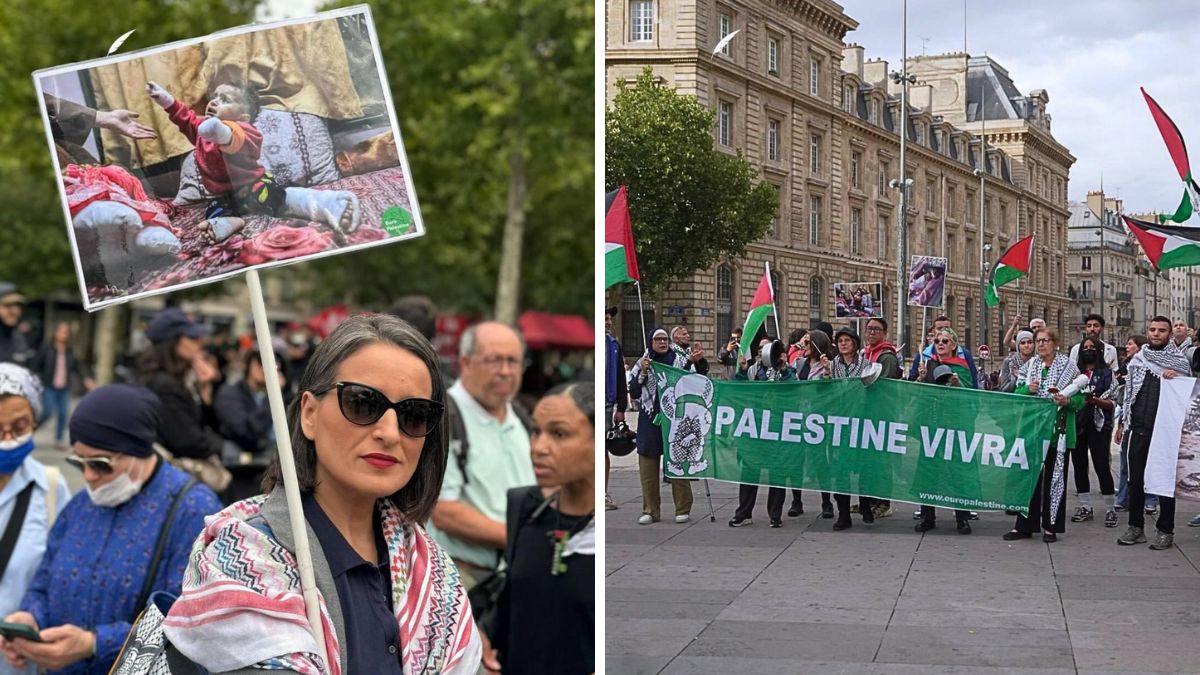France confronts a surging wave of antisemitism
 A pro-Palestine rally in France | X
A pro-Palestine rally in France | X
France, home to Europe’s largest Jewish population, is once again wrestling with a surge in antisemitic sentiment that has alarmed political leaders, Jewish communities and rights groups alike. While antisemitism has long cast a shadow over French society, recent incidents, political decisions and disturbing trends among the youth suggest a deepening crisis that may prove more difficult to contain.
The latest flashpoint came over the weekend when the French government expelled Nour Atallah, a student from Gaza who had arrived on a scholarship to study at Sciences Po Lille. Her visa, granted under a programme overseen by Foreign Minister Jean-Noël Barrot and the French Consulate in Jerusalem, was swiftly revoked after posts from her social media accounts were discovered glorifying Adolf Hitler, calling for the execution of Jews and celebrating the October 7 Hamas attacks. The posts, now deleted, triggered a judicial inquiry and led to her deportation to Qatar.
The scandal has ignited intense scrutiny over France’s vetting procedures for Gazan students. Barrot has frozen all student evacuations from Gaza pending an internal investigation. The incident has highlighted a broader unease within France over the intersection of the Israel-Palestine conflict and domestic communal tensions.
Even before Atallah’s expulsion, antisemitic incidents were climbing at an alarming rate. In Paris alone, three synagogues and a Jewish restaurant were recently vandalised with green paint, while the city’s Holocaust memorial was defaced twice, including with anti-Israel graffiti. In Lyon, swastikas and hateful slogans appeared on classroom walls of a primary school that was also set on fire. While the blaze was quickly extinguished, the symbolism was chilling.
France has a painful history with antisemitism. During the Vichy regime between 1940 and 1944, the state collaborated with Nazi occupiers to deport around 76,000 Jews to death camps. Although the Republic has since formally acknowledged and condemned these crimes, the legacy continues to haunt French political and social life.
The latest wave of hostility is unfolding against the backdrop of the ongoing Israel–Hamas war. According to the American Jewish Committee’s (AJC) 2024 Survey of Antisemitism in France, younger generations are increasingly vulnerable to antisemitic ideas, often masked as anti-Zionism. More than a third of French people aged 18 to 24 reportedly believe that attacking Jews is justifiable if they support Israel. Among French Jews under 25, 64 per cent have experienced verbal abuse due to their heritage.
Anne-Sophie Sebban-Bécache, head of AJC Paris, warned that this generational shift is the result of a long campaign to equate Jews and Zionism with oppression, racism and colonialism. “We cannot normalise a society where hatred towards Jews is treated as political discourse,” she said during a recent national conference convened by Aurore Bergé, the minister delegate for gender equality and the fight against discrimination.
The resurgence of antisemitism is not only verbal or symbolic. Some attacks have turned violent. Synagogue arsons and the rape of a 12-year-old Jewish girl have added to the climate of fear among France’s Jewish population. Ariel Kandel, head of Qualita, a group helping French Jews move to Israel, warned that “this announcement puts our brothers in France in danger and could encourage antisemitism,” referring to the Macron government’s recent decision to support the recognition of a Palestinian state.
That policy shift, while applauded in some international forums, has deeply divided French society. Many in the Sephardic Jewish community, traditionally supportive of Israel, feel betrayed by what they see as a failure by President Emmanuel Macron to stand by Israel in its fight against terrorism. French-Israeli analyst Myriam Shermer noted that Macron’s criticisms of Israel have alienated many French Jews who feel increasingly abandoned by the state.
Meanwhile, the far left has fully embraced the Palestinian cause, while Marine Le Pen’s previously antisemitic far-right party has realigned itself as pro-Israel. These political reversals reflect not a newfound moral clarity but rather a reshuffling of ideological interests. French Jews, caught between both extremes, face rising hostility from both ideological camps.
The expulsion of Atallah and the emergence of similar cases, such as that of Fady Hossam Hanona – a Gazan journalist who received refugee status in France despite posting virulently antisemitic messages – have raised uncomfortable questions about France’s asylum and immigration policies. In July, the French National Court of Asylum ruled that all Palestinian nationals from Gaza not protected by the UN qualify for refugee status due to the risk of persecution by Israeli forces. Critics argue that this broad ruling may inadvertently shelter individuals who espouse hate.
Interior Minister Bruno Retailleau, who ordered the closure of Atallah’s X (formerly Twitter) account, has been among the most vocal in warning against what he calls the “propaganda of Hamas operatives.” He also condemned the recent spate of vandalism against Jewish institutions as “odious acts” aimed at intimidating the Jewish community.
Despite the rise in threats, many French Jews remain defiant. The AJC survey revealed that 73 per cent of them feel their Zionist beliefs were strengthened after the October 7 attacks. Seventy-one per cent said their Jewish identity had deepened in response to the violence.
Resilience, however, is not the same as safety. Over the past decade, around 50,000 French Jews have emigrated to Israel, citing fear, alienation and a lack of government protection. If current trends continue, that number is likely to grow.
Middle East